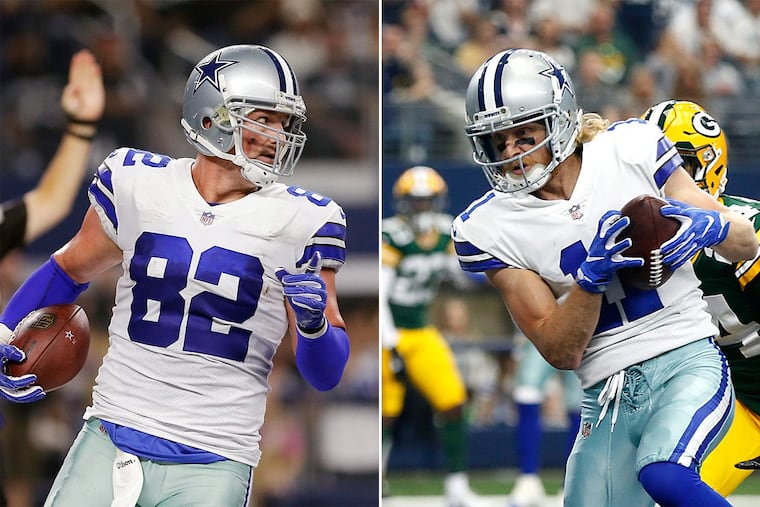To beat shorthanded Cowboys, the Eagles should focus on Cole Beasley, Jason Witten | Mike Sielski
The Cowboys won't have Ezekiel Elliott and might not have left tackle Tyron Smith, so they could rely on a short-passing game. Malcolm Jenkins and Patrick Robinson will be under the microscope.

A week ago today, Cory Undlin was hunkered down, watching film of Cole Beasley. Undlin is the Eagles' secondary coach, so the study session was not part of some odd fixation with slot receivers and the routes they run. It was his job, and he was getting an early start. The Eagles had another 13 days before their game in Arlington this Sunday against the Cowboys. Most of the players already had left the NovaCare Complex and wouldn't be back for close to a week. Undlin was in his office, studying up. Beasley was his text.
"He's a good player — very, very skilled in there," Undlin said, and that's been true for a while. Since entering the NFL in 2012, Beasley has become one of the league's better slot receivers; he had a career-best 75 catches last season. This year has been more of a struggle for him, both on the field and off. Through nine games, he has just 24 receptions and is averaging what would be a career-low 7.8 yards per catch. And on Sunday night, after a 27-7 loss to the Falcons dropped the Cowboys to 5-4, he tried to defend quarterback Dak Prescott from criticism on Twitter and got into an unfortunate exchange with an Eagles cheerleader.
Throughout his career, though, Beasley has been productive against the Eagles. In 10 games, he has 37 catches for 387 yards and two TDs. And Jason Witten, Dallas' longtime and likely Hall of Fame-bound tight end, has bedeviled the Eagles for a decade and a half now: 149 catches, 1,618 yards, and eight touchdowns in 27 games. Those two players would have been objects of Undlin's and the Eagles defense's attention anyway, but stopping Beasley and Witten should take on greater importance for the Eagles in light of two damaging developments for the Cowboys: the six-game suspension of running back Ezekiel Elliott and injuries to left tackle Tyron Smith.
Back and groin problems forced Smith to sit out against Atlanta, and his replacement, Chaz Green, prevented Falcons defensive end Adrian Clayborn from tying the NFL record for most sacks in one game, helping to limit Clayborn to just six. Had the Cowboys run the ball more frequently and more effectively, it might have helped mitigate Green's embarrassment. But they didn't have Elliott, and even though they were down by just three points midway through the third quarter, they never got around to feeding Alfred Morris, who carried just 11 times.
Elliott definitely won't play Sunday against the Eagles. Smith might, but even if he does, he won't be at full strength. To alleviate the effect of the pair's absences, particularly against the Eagles' pass rush, Dallas could rely on Morris and Darren McFadden more than it did against the Falcons. Given that the Eagles this season have held opponents to 3.6 yards per carry, the third-best mark in the league and one of the reasons they're 8-1, that strategy doesn't seem all that promising for the Cowboys.
The alternative is to have Prescott try to complete short, quick passes before the Eagles' defensive linemen have a chance to chase him down. Presumably, his top targets for such passes would be the two receivers who most often line up in the slot, Beasley and Witten, which in turn would put pressure on nickel cornerback Patrick Robinson and safety Malcolm Jenkins, the defensive backs most likely to cover Beasley and/or Witten.
This emphasis on a third receiver — an offense's use of him, a defense's measures to counter — is nothing new. Undlin's first season as an NFL assistant coach was 2004, and his debut coincided with the league's decision to have game officials keep a sharper eye out for illegal-contact and pass-interference penalties. The stricter enforcement of these infractions immediately opened up the passing game for teams around the league. It's no coincidence that Peyton Manning set what was then the NFL single-season record for touchdown passes, 49, that same season, and coaches continued diversifying their offensive systems thereafter. That shift, Undlin said, is the greatest change he's seen since entering the league.
Tight ends and slot receivers could create, and still often create, headaches for defensive coordinators because it's so difficult to find players with the combination of speed, strength, and coverage skills to handle them.
"Things happen fast in there," Undlin said. "They're closer to the box. People are going to 11 personnel — three wideouts — on first down and second down, and teams do that on purpose to make you put the nickel out there, and then they're going to run the ball. First and second down, the guy's basically an outside linebacker. …
"You've got to be tough. You've got to be smart. You've got to be able to cover. You've got to be able to tackle. You've got to know where you fit in the run game. You've got to know what the front is. We're out there in nickel more than we are in base. That guy's playing a lot of snaps."
The Eagles are fortunate to have two players, Robinson and Jenkins, who can play those snaps and handle that responsibility. It's a safe bet that Prescott will be looking their way Sunday, as he tries to find Beasley and Witten. Considering who the Eagles are and whom the Cowboys are missing, he might not have any other choice.